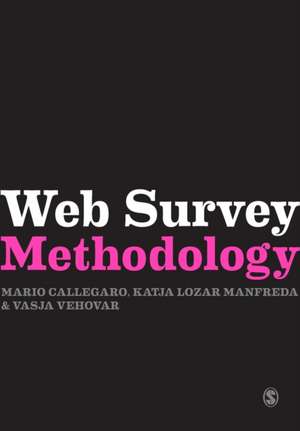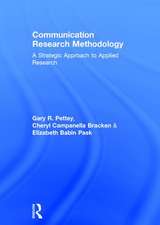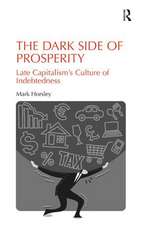Web Survey Methodology: Research Methods for Social Scientists
Autor Mario Callegaro, Katja Lozar Manfreda, Vasja Vehovaren Limba Engleză Paperback – 24 mai 2015
The book is intended for students, practitioners, and researchers in fields such as survey and market research, psychological research, official statistics and customer satisfaction research.
| Toate formatele și edițiile | Preț | Express |
|---|---|---|
| Paperback (1) | 406.86 lei 6-8 săpt. | |
| SAGE Publications – 24 mai 2015 | 406.86 lei 6-8 săpt. | |
| Hardback (1) | 918.68 lei 38-44 zile | |
| SAGE Publications – 20 mai 2015 | 918.68 lei 38-44 zile |
Preț: 406.86 lei
Nou
Puncte Express: 610
Preț estimativ în valută:
77.87€ • 84.06$ • 65.29£
77.87€ • 84.06$ • 65.29£
Carte tipărită la comandă
Livrare economică 19 aprilie-03 mai
Preluare comenzi: 021 569.72.76
Specificații
ISBN-13: 9780857028617
ISBN-10: 0857028618
Pagini: 344
Dimensiuni: 170 x 242 x 18 mm
Greutate: 0.54 kg
Ediția:1
Editura: SAGE Publications
Colecția Sage Publications Ltd
Seria Research Methods for Social Scientists
Locul publicării:London, United Kingdom
ISBN-10: 0857028618
Pagini: 344
Dimensiuni: 170 x 242 x 18 mm
Greutate: 0.54 kg
Ediția:1
Editura: SAGE Publications
Colecția Sage Publications Ltd
Seria Research Methods for Social Scientists
Locul publicării:London, United Kingdom
Recenzii
This is an excellent, academic standard, book that every serious market researcher should own and consult. The authors have compiled an immense amount of useful and well-referenced information about every aspect of web surveys, creating an invaluable resource.
The authors guide us through the whole survey process and include modern developments, such as paradata and mobile surveys. A must-have for everyone planning an online survey.
Comprehensive and thoughtful! Those two words beautifully describe this terrific book. Internet surveys will be at the centre of survey research for many decades to come, and this book is a must-read handbook for anyone serious about doing online surveys well or using data from such surveys. No stone is left unturned - the authors address every essential topic and do so with a remarkable command of the big picture and the subtleties involved. Readers will walk away with a clear understanding of the many challenges inherent in conducting online studies and with an appropriate sense of optimism about the promise of the methodology and how best to implement it.
Read on and pick from the basket of useful pieces of advice that Mario Callegaro and his colleagues have put together! This is a very rich resource for practitioners and students within web survey methodology.
Their book takes the reader through the past fifteen years of research in Web survey research and methodology. It provides practical guidance on the current techniques for collecting valid and reliable data and offers a comprehensive overview of research issues. These include: preparation for questionnaire design; recruitment testing; data analysis; and survey software. These major topics are covered in a systematic and insightful way.
The authors of the present work have opted for the 'longest way', the 'most difficult', yet to expose all aspects related to the survey tool, making the reader with little experience to develop a complete investigation.
It is a text accessible to the beginner and extremely exhaustive for the experienced by providing other points of view and numerous bibliography in which to deepen.
The authors guide us through the whole survey process and include modern developments, such as paradata and mobile surveys. A must-have for everyone planning an online survey.
Comprehensive and thoughtful! Those two words beautifully describe this terrific book. Internet surveys will be at the centre of survey research for many decades to come, and this book is a must-read handbook for anyone serious about doing online surveys well or using data from such surveys. No stone is left unturned - the authors address every essential topic and do so with a remarkable command of the big picture and the subtleties involved. Readers will walk away with a clear understanding of the many challenges inherent in conducting online studies and with an appropriate sense of optimism about the promise of the methodology and how best to implement it.
Read on and pick from the basket of useful pieces of advice that Mario Callegaro and his colleagues have put together! This is a very rich resource for practitioners and students within web survey methodology.
Their book takes the reader through the past fifteen years of research in Web survey research and methodology. It provides practical guidance on the current techniques for collecting valid and reliable data and offers a comprehensive overview of research issues. These include: preparation for questionnaire design; recruitment testing; data analysis; and survey software. These major topics are covered in a systematic and insightful way.
The authors of the present work have opted for the 'longest way', the 'most difficult', yet to expose all aspects related to the survey tool, making the reader with little experience to develop a complete investigation.
It is a text accessible to the beginner and extremely exhaustive for the experienced by providing other points of view and numerous bibliography in which to deepen.
Cuprins
Chapter 1: Survey research and web surveys
Definition and typology
Web survey process
Evolution of web surveys, applications and related practices
Chapter 2: Pre-fielding
Mode elaboration
Sampling
Questionnaire preparation
Technical preparations
Nonresponse strategy
General management
Chapter 3: Fielding
Recruiting
Measurement
Processing and monitoring
Chapter 4: Post-fielding
Data preparation
Preliminary results
Data exporting and documentation
Chapter 5: Selected topics in web survey implementation
Smartphones, tablets and other devices
Online panels
Web survey software
Chapter 6: Broader context of web surveys
Broader methodological context
Web surveys within the project management framework
The web survey profession
Web survey bibliography
Chapter 7: Future of web surveys
General technological developments
Web survey software
Methodology
Broader business and societal issues
Chapter 8: Conclusions
Definition and typology
Web survey process
Evolution of web surveys, applications and related practices
Chapter 2: Pre-fielding
Mode elaboration
Sampling
Questionnaire preparation
Technical preparations
Nonresponse strategy
General management
Chapter 3: Fielding
Recruiting
Measurement
Processing and monitoring
Chapter 4: Post-fielding
Data preparation
Preliminary results
Data exporting and documentation
Chapter 5: Selected topics in web survey implementation
Smartphones, tablets and other devices
Online panels
Web survey software
Chapter 6: Broader context of web surveys
Broader methodological context
Web surveys within the project management framework
The web survey profession
Web survey bibliography
Chapter 7: Future of web surveys
General technological developments
Web survey software
Methodology
Broader business and societal issues
Chapter 8: Conclusions
Descriere
Covering core topics from preparation to questionnaire design, recruitment testing to analysis and survey software, this book covers the past 15 years of research and provides readers with practical direction on techniques for collecting valid and reliable data.













